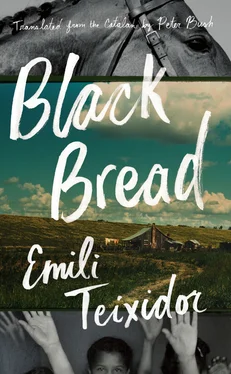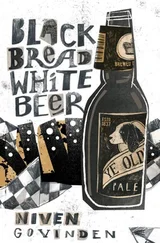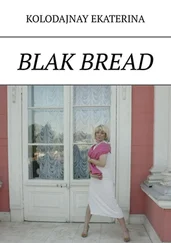“You’re such an idiot!” laughed Quirze. “How would we ever see anything? It’s pitch black at night and we won’t see the new colours until the following morning, when it will all be over and done with!”
However, Cry-Baby was stubborn and ignored him. She’d say nothing and I could tell from her determination, from her staring eyes, firm lips and jutting chin that she wouldn’t give up until she got a proper answer.
From the tree we used to gaze at the mysterious little lights in the cells in the Saint Camillus monastery as they lit up one after another, indicating that the friars, brothers and novices were getting ready to go out to care for the moribund souls in the neighbouring farmhouses or village.
Until someone howled from the gallery: “Where have those little blighters got to?”
“I want to see them here breaking up the sweetcorn. Or fetching buckets of water for the troughs or the sink.”
Cry-Baby was such a ninny nobody ever included her in their summons.
“They’re back up the plum tree!” shouted an astonished Dad Quirze or a farmhand, usually Jan, the oldest hand, who was like a piece of the furniture.
“Where did you get those blankets?” raged Ció, as she watched us walking towards her, shamefaced, with our blankets. “No corner of this house is safe with you drones buzzing around. I’ve told you a thousand times not to touch the things I keep in the two big baskets in the doorway, whatever they might be. These blankets don’t belong to us! Put them back where you found them right away.”
And when we were just about to return them to the big basket, before removing the lid, Ció snatched them from us, looking alarmed: “Leave them on the floor! Don’t ever touch them again. Nobody must touch them. They are all infected. Go and wash your hands at once, you naughty devils! You’re disgusting!”
We three didn’t know what to do next. We knew Ció was contradicting herself and we put that down to her being so upset by our mischief-making. We didn’t understand why the easygoing Ció was getting worked up by what we thought was a worthless pile of cloth no doubt destined to be used by the livestock, the mule, the mares, the horses or the colt, that was small and frisky like a toy and the one we liked best.
“They are the blankets the Saint Camillus friars threw out because they stank to high heaven. Ugh! They used them to cover their ill patients until they breathed their last. Most were draped over the ones with TB who sun themselves in the heartsease garden. Ugh! I wasn’t very keen to take them, and I only did so as a favour, and I didn’t touch a single one with my hands, I stuffed them in the big basket using tongs and a pitchfork.”
However, whenever we spied on the heartsease garden from the top of the plum tree, or, especially when we’d stood by the wall separating the land around the farmhouse near the pond and hazelnut spinney from the monastery gardens and orchards, we were horrified to see a row of naked, skeletal bodies stretched out, all young men, sunning themselves in a meadow full of yellow daisies, pale pink carnations, bright red poppies and purple, almost lilac or mauve heartsease, the colour of the habits the Saint Camillus order reserved for Holy Week. All those boys, or rather, young men, lay on the whitest of sheets, some clutching a corner to cover their nether parts, the area that most drew our attention, the bit that fascinated us infinitely more than their emaciated faces, sunken eyes, the small beads of sweat on their temples, their chests striped by protruding ribs, bellies, collapsed in some cases, swollen in others, and their off-white or yellow rancid butter skin…, those blackened, shrunken genitals and a crop of lank hair like an obscene black bloodstain…, monsters in our eyes, phantoms from a forbidden world, sickly, worn down and consumed by a horrible microbe, victims of a contagious, suppurating disease like the rabies dogs spread or sheep’s foot-and-mouth, that can be caught simply by breathing the air or drinking from the same glass a TB sufferer has used, an accursed disease, contracted as a result of an errant life of vice, sick men condemned in life, proof of the deity’s pitiless punishment of sin, swaddled in white sheets like premature cadavers in dazzling white shrouds… Yet we’d never seen one under a blanket.
A black umbrella was planted next to the sheets of just three or four TB sufferers, so the shade protected their heads. The presence of those faceless bodies, some shamelessly displaying their sexes, were shocking in our eyes and beyond words. A mystery and a secret no one could fathom. And a friar sat next to the little gate from the vegetable plots to the monastery garden, reading his breviary and never looking up, as if to have sight of the infirm was to behold evil, physical evil, a palpable sign of invisible spiritual evil, a repugnant manifestation of sin.
We didn’t touch another blanket that autumn. But the two baskets, especially the big one, were inexplicably marked out as things only adults could handle. Why did they keep those dangerous blankets in that place of transit, within everyone’s reach and what should the movers and shakers in the house — Dad Quirze and Aunt Ció—the delegates of our invisible masters, do about them? Why didn’t the friars destroy them in the monastery if they were worthless? What deal had they done over those ignominious bits of cloth?
“They should be washed back and front, boiled, scrubbed, scraped, dusted and dried and then we’ll see if they are any use,” said Ció on that occasion, after she’d calmed down. “On Saturday when we go to the market in Vic, we’ll leave them with the wenches who launder the lovely linen from the Poor Hospital, and let’s see what they can do. The Town Hall allows those nuns to use the communal wash-house all night, when nobody else washes and the water is filthy from all the daytime washing. On Sunday, when the sisters have finished, they change the water. And even then the wretched Saint Camillus folk won’t make anything from them.”
However, one day, surely another autumn, when we were looking for clothes to keep us warm, when the weather drove us from our tree, when we’d all forgotten her little rant, Aunt Ció mentioned those blankets again.
“Don’t touch the blankets!” she said this time. “God knows where those damned friars found them! I expect they collected them up after the war, when they returned to the monastery the lice-ridden militia had occupied like a barracks, and the church was full of shit, with hens running round the altar and sheep penned up in the Chapel of the Most Holy Spirit as if it were a stable… I bet they found them on the floor abandoned by the Republican soldiers who’d had to beat it hell-for-leather when the fascist troops, led by the Moors, entered Vic. And now they don’t know what to do with them, they can’t use them, not even to wrap up the sick, and they want us to sell them in the market: I wonder what we’ll get for rags that are so old and filthy not even the novices in the monastery want them, ugh, and so full of bugs they need washing at least ten times.”
We never saw anyone take the blankets to Vic market on that Saturday or any other.
Adults think children have the same poor powers of recall they have. They forget we children have no memories of anything, that words and acts are all new to us and every little detail remains automatically etched on our brains.
The colours of autumn brought all kinds of other transformations.
Many trees started to shed leaves; the green grass of the meadow faded; flocks of swallows and finches spread across the sky like nets in flight and waited a whole evening or a couple of days for stragglers to join them and when they were all gathered, they’d be gone in a flash until next year; the elder tree behind the house rained down tufts of white that bathed the ground in warm, round flakes of snow and the entire meadow was filled with that strong, sharp, medicinal smell, the one that shot up your nose to your brain, leaving a taste of mint and aniseed.
Читать дальше












